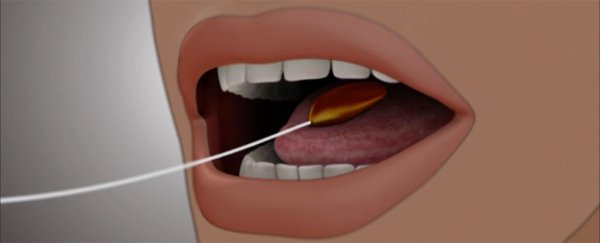For people who find it hard or impossible to lose weight via conventional methods, surgical options such as lap band procedures are one way of reducing people's appetites – by physically limiting the amount of free space the stomach has to offer.
But a new wave of 'gastric balloons' may offer the same benefits without the need to go under the knife, and in research presented this week, one of these products – and the first to involve no medical procedures – has been shown to be successful in helping patients lose significant amounts of weight.
Elipse, manufactured by Allurion Technologies, has not yet been approved for use in the US by the Food and Drug Administration (FDA), but a new study of the 'first procedure-less gastric balloon' suggests dieters may soon be able to remove food cravings for months at a time by simply swallowing a single pill.
The kicker is that the pill in question is no ordinary pill. Once swallowed, the capsule dissolves in the stomach, freeing a miniaturised, deflated gastric balloon. A physician is then able to expand the balloon, filling it with 550 ml of liquid via a catheter, which leads up and out of the patient's mouth. The balloon swells to the size of a grapefruit when filled with the liquid, occupying much of the available space in a patient's stomach.
The catheter is then removed, and the patient can go home, happy in the knowledge that the grapefruit-sized balloon in their stomach will suppress their appetite for four months. After that period has elapsed, a valve on the balloon automatically opens, and the deflated balloon passes safely through the gastrointestinal tract and is excreted.
So how effective is the filled balloon in nixing food cravings? In a study by the company's researchers presented at Obesity Week 2015 in Los Angeles, interim results for a group of 34 patients trialling the device lost more than a third of their excess body weight by using the balloons, averaging 10 kilograms in weight loss after four months. Patients also saw improvements in triglycerides and haemoglobin A1c levels, which could lower their risk of diabetes and heart disease.
Pretty impressive stuff. Some patients reported experiencing nausea and vomiting as side effects, which is known to happen with other gastric balloons on the market. It's also worth noting that the Elipse, should it receive regulatory approval, is only designed for patients with a body mass index (BMI) above 27 and shouldn't be used for long-term weight loss – but for people who need help getting started on the journey to a safer, lighter body, this could be an attractive weight-loss option.
"New treatment options are being studied and approved for the treatment of obesity, which is good news for our patients and the healthcare professionals involved in their treatment," said Ninh T. Nguyen, MD, a professor in surgery at the University of California, Irvine, who was not involved in the study. "For many struggling with their weight, procedure-less gastric balloon devices may serve as a treatment option that bridges the gap between weight-loss drugs and surgery."
